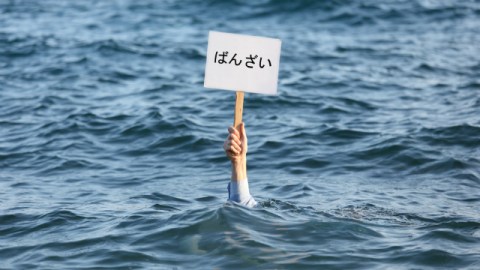If all Chinese go to the coast and spit, Japan will drown

THAT is a common joke among mainland Chinese who outnumber the Japanese roughly ten to one. It also mocks Japan’s geographical tininess. (It’s not a small country, bigger than Germany or Italy, but still less than a 1/25 the size of China.) Another running gag is how teachers, when drawing maps on blackboards, frequently pretend to not knowing where Japan is actually located, or where did it go, or sometimes they even confound it with Taiwan.
Nationalism
This would all be very entertaining, if it wasn’t fueling China’s nationalism. And, wow do they loath the Japanese! On a trip to Songshan, an important cultural center in Henan province, last year I saw various shop signs sporting slogans like: “Japanese and dogs not allowed.”
The War of resistance against Japanese aggression marked the birth of the Communist Party of China; the very reason of its reason d’être (besides also expelling the Western imperialists). Understandably, the Party wants to keep this monster alive in the hearts and minds of the Chinese. Already in elementary school, kids are taught that those riben guizi (Japanese devils) are China’s natural enemy.
Despite all this, or maybe because of it, Japan does little to emotionally connect to the feelings of those people that it had wronged (e. g. the Nanjing massacre, the so-called ‘comfort women’, etc.).
Provocations
The latest burst of anti-Japanese sentiments (apart from the Diaoyu/Senkaku island dispute) was Prime Minister Shinzo Abe’s visit to the Yasukuni war shrine in Tokyo on December 26, 2013. Surprisingly, however, unlike the massive 2012 anti-Japanese demonstrations, Abe’s incident didn’t result into attacks on Japanese companies. Uniqlo and 7-eleven branches didn’t have to close shop out of fear from vandalism;Japanese students didn’t have to hide in their dormitories and so on.
In fact, during the entire year 2013 it was still possible to order riben-shi taocan (Japanese-style set) on Peking University’s campus; and packages sent from the university’s post office to Tokyo weren’t subject to frisking and tossing as they were was back in September 2012. Moreover, there were no official calls for demonstrations in Beijing. Overall then, China may have gotten exhausted a bit from Japan’s constant provocations.
Motives
One thing has never changed, I think, during the last decade or so of Sino-Japanese psychological warfare: If you ask scholars, be it in China or in Japan, who they believe is ultimately responsible for this mess of distrust, suspicion, and power games, they will almost inevitably pause for a second, blush, and then tell you with the most reassuring conviction that the greatest beneficiaries of Japan’s re-militarization and China’s containment are the United States of America.
To this day, no joke has been reported which also has the Chinese spit and sink US aircraft carriers.
Image credit: Lilyana Vynogradova/Shutterstock.com





